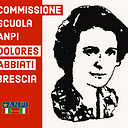Partisan Ilio Barontini, a truly international freedom fighter
Ilio Barontini (1890–1951) was an Italian partisan leader and guerrilla strategist, later a member of Italy’s constituent assembly and a Communist Senator until his untimely death in 1951.
A guerrilla fighter in China, volunteer in Republican Spain, organizer of the Ethiopian Resistance against Mussolini’s troops, partisan in France and Italy, he was awarded the Bronze Star Medal by the Allied Forces, and the Order of the Red Star by the SovietUnion.
A founding member of the Italian Communist Party in 1921, he fought against the fascist squad violence that would soon bring Mussolini to power.
Arrested in 1927, Barontini escaped to the Soviet Union, where he was given military training by the Red Army. Dispatched to China, he received guerrilla warfare training in Mao Zedong’s army.
In 1931, he moved to France, where he kept up his work as an anti-fascist organiser among the Italian exiles and emigrant workers.
Barontini rushed to Spain in the early stages of the Civil War, where he fought in the International Brigades, leading the Garibaldi Battalion in the battle of Guadalajara. He also fought in Jarama and Huesca.
In 1938, he was dispatched to Ethiopia with two comrades, Domenico Rolla and Anton Ukmar, to organize the local partisans against Mussolini’s colonialist troops. The trio, known as “The three apostles”, founded a bilingual information sheet, and organised the Ethiopian rebels. Pursued by Rodolfo Graziani’s agents, he fled to Khartoum, where he was awarded the Bronze Star Medal by Gen. Harold Alexander.
When France fell under Nazi occupation, Ilio Barontini was already active there, and he played a major role in organising the Francs-tireurs et Partisans (FTP).
When Resistance came out into the open in Italy, after the 8th of September 1943, Barontini was called back. His role was vital in organising a strong armed response, particularly in the main Italian cities, against the reorganised fascist forces and nazi occupation troops. He designed and organised the Patriotic Action Groups (GAP), small urban warfare units that tirelessly attacked troops and army officers in Turin, Milan, Rome, and other cities.
After the war, Barontini was elected to Italy’s constituent assembly and, later, to the Senate. He also served as a member of the ruling committee of the Italian Communist Party.
He was killed in a car accident near Florence on January 22nd, 1951.
(Sources: @Wu_Ming_Foundt; ANPI; Wikipedia)
